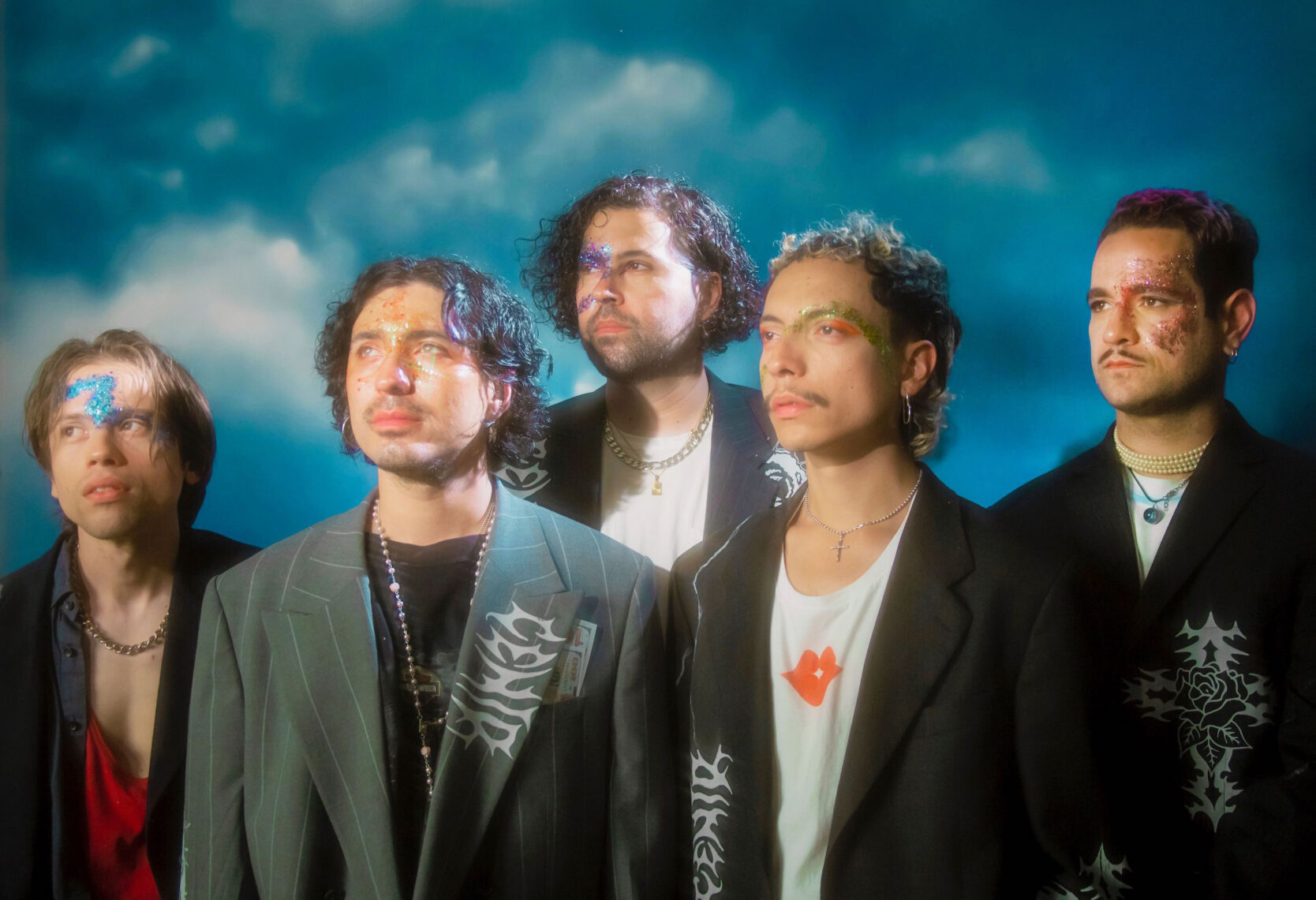The onset of the pandemic separated most of us from our routines and normal sources of support. It hurt, but it wasn’t always bad. The members of Chicago indie-pop band Divino Niño are among those who found freedom in the isolation. They exited 2020 with an album that’s fun, thoughtful, and possibly even healing, by throwing out their preconceptions.
Those familiar with the sunny, psychedelic jangle of Divino Niño’s full-length debut, 2019’s Foam, will notice a shift in gears on the quintet’s follow-up, Last Spa on Earth. The project opens with a viscous dembow beat, over which guitarist Camilo Medina and bassist Javier Forero languidly sing-rap. Over the next 11 tracks, lush synth pop mingles with reggaeton, house, and trap. Upbeat single “Tu Tonto” has a bit of everything, including drum and bass.
Medina, Forero, and guitarist Guillermo Rodriguez, who all sing and rap mostly in Spanish on the new album, find that the songs’ more electronic presentation helped them access a range of feelings and moods — including “sassiness” — that they couldn’t reach on earlier releases.
“It’s easier to express certain things, especially because we’re singing in Spanish. With Foam, we never got sassy, but on ‘Miami’ we have a real sassy verse,” Medina quips over a Zoom call from his arty apartment. With bleached hair and a hot-pink vintage T-shirt, Medina — whose other job is graphic design and illustration, and who does the band’s album art — looks perfectly at home relaxing in front of an overstuffed couch, easel, a colorful geometric print, and an enormous plant. Three other equally laid-back band members join the call from their own places.
“It definitely opened a box of emotions, because, at least from my end, I was trying to fit in the indie scene of Chicago. There’s really not many Latin bands in the scene. It’s mostly white people. So the whole time, I just felt so constricted. Like, ‘Oh, my God, the pants gotta be like this,’” Medina jokes. “When we started making music like this, it kind of exploded, like, ‘Yo, I don’t know who made up all these rules because I don’t think they are real.’”
Since the band’s 2013 formation, while Medina and Forero were students at the School of the Art Institute of Chicago, they’ve been an integral part of the city’s music community. “When we were writing Foam, our source of inspiration was the indie Chicago scene, which a lot of great bands have come out of, like Whitney, Twin Peaks, Mild High Club,” Medina says. “Those were our friends, and that was the community we were in.” This is the band’s circle: Last Spa on Earth features Whitney’s Will Miller on trumpet and Colin Croom of Twin Peaks on lap steel. But in 2020, their circle was broken.
“We were working on the album when the pandemic hit and got completely disconnected from the scene. We’re not going to any of these shows, not hanging out with any of our friends,” Medina recalls. But this time, while painful, was also freeing. “What ended up happening is we started sharing music amongst each other,” he continues. Cut off from their usual sources of musical exchange, new sonic avenues opened up. Never a fan of mainstream reggaeton, Medina fell in love with neoperreo when he heard Isabella Lovestory’s “Mariposa.” It was the first step toward a major tipping point.
“After that, our friend from New York, Michael [Hernandez] came to visit us, in the middle of the pandemic, in Chicago, and we’re like, ‘You know Isabella Lovestory?’ And he’s like ‘Yeah.’ So we went to the park and took some mushrooms, and he’s like, ‘Let me show you some of this shit that you guys don’t know about.’ That’s what started this big flip,” Medina says. Later, Hernandez (who produced all but two tracks), Medina, and Forero all got matching butterfly stick-and-poke tattoos from a friend — perhaps in subconscious homage to “Mariposa.”
Exploring new genres online led to writing in new styles — and before long, those experiments started sounding pretty good. The days of quarantine also required the band to find new ways to make music if they were to work at all. “We all started getting into programming during the pandemic because we weren’t meeting as a band,” explains drummer Pierce Codina, who started making beats using the electronic music production program Ableton. As often happens when creating music in the digital realm, theoretical genre barriers gradually fell away.
The result harnesses the oddly joyful, no-fucks-given energy of The Beastie Boys or Beck in the ’90s. It makes a great soundtrack to the chaos of the present moment and even offers something like a prescription, one now being dispensed onstage.
“Now it feels really good to play these songs, because it’s a party, you know?” Medina reflects. “You got a nice fat beat and some subs. People have no other choice but to dance really hard.”




